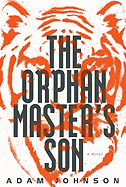
Jun Do, the eponymous orphan master's son of Adam Johnson's second novel (after 2004's Parasites Like Us), picks out the names for the orphanage's wards from a list of North Korean revolutionary martyrs, which is also how he got his own name. "The revolutionaries in Pak Jun Do's unit didn't trust him because he was descended from an impure blood line," he explains to his partner in a commando squad that kidnaps Japanese citizens at the whim of Kim Jong Il and other high-ranking officials. "To prove his loyalty, he hung himself."
Such morbid fatalism pervades every scene in The Orphan Master's Son. Even at its funniest--and there's a lot of humor here--there's an underlying realization that one false move can send a character to the prison camps; when things go wrong, characters scramble to come up with plausible stories that will excuse the failure without incurring the wrath of the "Dear Leader."
As Jun Do's surreal odyssey builds up to a brazen impersonation of legendary Commander Ga, Johnson increasingly turns to new voices, including a series of over-the-top government propaganda bulletins--"Citizens, gather 'round your loudspeakers!"--that distort the story in Kim Jong-il's favor. Yes, the Dear Leader is a character in the second half of the book; he obviously knows that Jun Do isn't Commander Ga, but it amuses him to accept the deception, which means all of Pyongyang must play along--including Ga's wife, Sun Moon, the greatest actress in North Korea.
Though the split time structure of the novel's back half means readers can be pretty sure ahead of time what will happen, Johnson guarantees that they'll want to see just how it happens. --Ron Hogan

